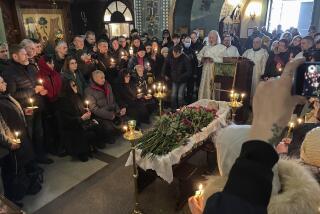Hundreds Mourn Sakharov in Vigil Outside His Home
- Share via
MOSCOW — They gathered spontaneously, hundreds of them, and stood for hours in a light snowfall Friday in front of the gray brick building where Andrei D. Sakharov lived and died. They were paying silent tribute to the man many called “the conscience of our nation.”
Some carried red carnations. Some wept.
News of Sakharov’s death Thursday night swept through the streets like a Russian winter wind, and people who had never exchanged a word with the defiant activist, yet felt they knew him, collected at 48 Chekalov Street and huddled against the cold.
Upstairs in the modest apartment Sakharov had shared with his wife, Yelena Bonner, relatives and close friends, including former political prisoners, sipped tea, comforted one another and reminisced.
The unsolicited presence of so many--of people who knew the physicist and champion of human rights at various stages of his tumultuous life and people who followed it from afar--was a fitting commemoration. Friends said it would have pleased Sakharov as much as any honor he had received.
“He valued people above all, and he always stood ready to help anyone, even a stranger,” said Sergei Kovalyov, Sakharov’s close friend and an associate in the human rights movement for 21 years.
Kovalyov, who spent 10 years in exile for his political beliefs, said in an interview in the dimly lit hallway of the Sakharov apartment: “There are no words to express how I feel. This is a great loss, not only for his friends but also for the country and the whole world. Our Parliament will miss his vision and his honesty.”
Yelena Bonner sat ashen-faced beside Sakharov’s sheet-covered body and answered medical officials’ questions about the circumstances of her husband’s death. She refused requests for interviews, passing word out through friends that she preferred not to answer questions Friday and hoped that others would follow her example.
“You all did a lot to ensure that Andrei Dmitryevich died before his time, by telephoning day and night and giving us no chance to live, work or sleep,” she told reporters when she asked them to leave after Sakharov’s body was taken to the morgue.
A family friend said: “He was a public man, but this is a private time.”
Still, no one could stop the crowd from gathering outside the 10-story building where Sakharov moved in 1953, and where, in the 1970s, few strangers ever paused for fear of being questioned and harassed by KGB agents who monitored the activities of Sakharov and his wife.
“I just need to see him one last time,” said a 35-year-old Moscow woman who stood, crying quietly, at the entrance to the building. “I feel sad and angry at the same time--angry at those people who criticized him in the Parliament. Those attacks simply brought the day of his death closer.”
Sakharov’s protest over the 1979 incursion of Soviet troops into Afghanistan led to his exile in Gorky, where he remained until President Mikhail S. Gorbachev personally ordered his release seven years later.
His charges earlier this year that Soviet troops committed atrocities in Afghanistan--so far unproved--prompted another storm of criticism against him. And this time his detractors included liberals who had supported him on other issues.
Friends said Friday that Sakharov had gone public with the allegations because he always felt a compelling need to speak the truth as he knew it.
Sakharov was the “moral compass” of perestroika , the reform program undertaken by Gorbachev, fellow scientist Roald Sagdeyev said. He added: “I don’t know how we will continue without his everyday presence, his absolute integrity.”
Alexei S. Yekimovsky, a former official in the Ministry of Education who met Sakharov twice during his exile in Gorky but had not visited him since, wept as he pushed his way to the front of the crowd and past those gathered on the landing outside the sixth-floor apartment. He carried flowers that he hoped to give to Bonner.
“I was moved by his charm and his personality,” Yekimovsky said. “Sakharov seemed like something higher than a human to me. I asked his advice on personal matters both times I saw him. News of his death is quite a shock, quite a blow.”
Alexander Lavut, 60, a former political prisoner who spent three years in a labor camp and five years in exile until he was freed in 1986, recalled that Sakharov never forgot him during his years in prison. He said Sakharov often mentioned Lavut’s name when he referred to human rights violations, and occasionally sent him packages and letters of support.
“All his life he was very busy, but all his life he made time for people,” Lavut said. “He thought many things needed to be improved in Soviet society, even under Gorbachev, but he was an optimist. He believed that our lives could be better if we just worked to make it happen.”
A woman shivering in a thin, worn coat, said: “He was our conscience. His loss cannot be compared to anything else.”
More to Read
Sign up for Essential California
The most important California stories and recommendations in your inbox every morning.
You may occasionally receive promotional content from the Los Angeles Times.













